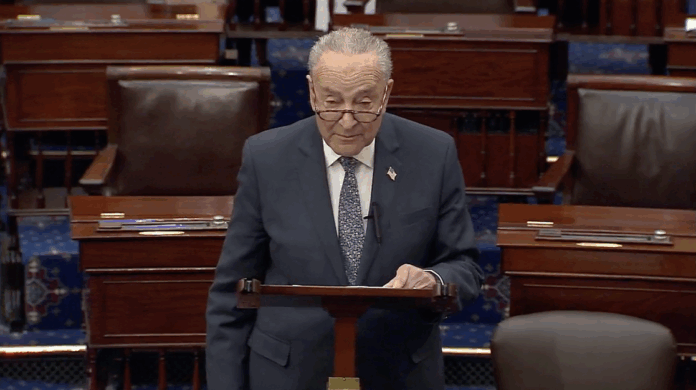WASHINGTON — By a self-imposed deadline of July 4th, Senate Republicans were attempting to approve their version of the big, beautiful tax relief and spending cut measure that President Donald Trump wants to become law.
However, the Democrats in the chamber started a flurry of amendment votes, compelling their Republican counterparts to speak out on difficult topics like reducing funding for food safety and health programs. Democrats had not won any votes as of early evening.
Even though their amendments are unlikely to succeed, the opposition party uses the strategy to highlight particular issues during intense budget reconciliation battles.
Among the many provisions in the mega-bill that Democrats criticized were new work reporting requirements for Medicaid, the federal-state health insurance program for the poor and disabled.
As legislative initiatives transfer major federal Supplemental Nutrition Assistance Program (SNAP) costs to states for the first time, there has also been a surge in vocal resistance.
As Sen. Amy Klobuchar of Minnesota stated on the Senate floor, “I tell our colleagues, vote for families over billionaires.”
The main body of the almost 1,000-page law makes permanent some tax advantages on company investments and R&D expenses while also extending and expanding the 2017 tax law to maintain individual income tax rates at the same level.
Additionally, the law would implement some of Trump’s campaign pledges, such as the temporary exemption from paying taxes on eligible tips, overtime, or auto loan interest.
As the United States approaches unprecedented levels of debt, a clause in the plan lifts the nation’s borrowing cap to $5 trillion, and the tax cuts are anticipated to cost close to $4.5 trillion over ten years.
According to the most recent estimate from the impartial Congressional Budget Office, the Senate bill would increase deficits by $3.25 trillion over the course of the next ten years.
Here are a few significant votes thus far:
Planned Parenthood
Sen. Patty Murray, a Democrat from Washington, attempted to get the bill’s clause that would prevent Medicaid funds from going to Planned Parenthood for a year unless the organization ceases conducting abortions removed.
With few exceptions, federal law already prohibits money for abortions. However, Republican senators have suggested prohibiting any further funds from flowing to Planned Parenthood, so preventing Medicaid patients from receiving other medical care from the organization.
Murray described the plan as a long-sought objective of anti-choice zealots and claimed that it would negatively affect the health care of lower-income women.
According to Murray, the Republican bill will deny millions of women access to cancer screenings, birth control, and other necessary preventative medical care that they would not be able to pay for elsewhere. Additionally, it will close about 200 medical facilities across our nation.
Sen. Cindy Hyde-Smith, a Republican from Mississippi, raised a budget point of order in opposition to attempts to repeal the policy change, and it was not waived after a 49-51 vote. Lisa Murkowski of Alaska and Susan Collins, a Republican senator from Maine, voted with Democrats.
According to Hyde-Smith, there was a time when preventing American tax dollars from funding the abortion industry was a nonpartisan, uncontroversial cause that we could all embrace.
Medicaid for undocumented immigrants
Senators from both parties disagreed on whether the federal government should reimburse a state less for its Medicaid program if the state enrolls undocumented immigrants using its own tax resources.
The Senate lawmaker determined that the measure, which was part of a previous version of the plan, did not adhere to the intricate guidelines for advancing a budget reconciliation bill.
The vote was 56-44, but it failed because at least 60 senators had to concur to suspend the rules and proceed with the amendment because it was on waiving a budget point of order.
Democratic Sens. Jon Ossoff and Raphael Warnock of Georgia, Maggie Hassan of New Hampshire, and Catherine Cortez Masto of Nevada all supported the Republican senators. Collins of Maine voted against proceeding, as did the majority of the Democrats in the House.
Sen. John Cornyn, a Republican from Texas, requested the vote, stating that he thinks the policy change will lower illegal immigration.
According to Cornyn, the Border Patrol discusses push and pull issues. The idea that there are a number of benefits available to those who enter the nation illegally is one of the pull factors.
Cornyn’s attempt to reintroduce the wording into the measure was met with opposition from Jeff Merkley, a Democrat from Oregon, who said the policy change would financially hurt states that expanded Medicaid under the 2010 health care reform for minor errors.
According to this amendment, the entire state bears the cost and has its rate on expanded Medicaid altered from 90% to 80%, Merkley stated, referring to the portion paid by the federal government, if one individual receives payments in violation of state law due to a bureaucratic error.
Reduction in funding for Consumer Financial Protection Bureau
The Senate Committee on Banking, Housing, and Urban Affairs is chaired by Republican Sen. Tim Scott of South Carolina, who vetoed an amendment to prevent a nearly 50% cut in funding for the Consumer Financial Protection Bureau.
The amendment was brought to the floor by Sen. Elizabeth Warren, a Democrat who supported the CFPB following the 2008 financial crisis, who claimed that the agency is the financial watchdog to prevent fraud on credit cards, mortgages, Venmo, payday loans, and a host of other transactions.
There is no one else in the federal government to take over when this financial cop is unable to perform their duties, Warren stated.
Scott used a budget point of order to block her, claiming that the agency still had enough money despite the cut. After a 47-53 vote, Democrats’ attempt to waive that procedural procedure was unsuccessful.
Because it did not comply with the requirements of the reconciliation process, the first provision to totally zero out the CFPB budget was left out.
Medicaid hospitals and maternal mortality
Sen. Lisa Blunt Rochester, a Democrat from Delaware, proposed to bring the bill back to committee to remove wording that would eliminate specific Medicaid funds. She said that this would have a severe impact on critical hospital services, particularly labor and delivery rooms, but the senators rejected her motion 48–52.
According to Blunt Rochester, Medicaid now covers 40% of births overall and almost half of births in our rural communities, making it the single largest payer of maternity care in the US. Maternity deserts are being created as a result of the alarming rate at which obstetric facilities are closing, especially in rural hospitals.
Collins of Maine voted in favor of the motion, but no Republican voiced opposition.
Supplemental Nutrition Assistance Program
Sen. Ben Ray Luj n, a Democrat from New Mexico, proposed to return the bill to committee in order to eliminate any modifications pertaining to the Supplemental Nutrition Assistance Program, or SNAP. Despite the support of Alaska Republican Senators Dan Sullivan and Murkowski, it was defeated by a vote of 49–51.
In order to demonstrate to our fellow Americans that we in this nation care for our friends, family, and neighbors in need, I’m giving my colleagues the chance to take a break from these heartbreaking cuts, Lujn stated.
The plans were challenged by Senate Agriculture Chairman John Boozman, R-Ark., who claimed that SNAP was headed in an unsustainable direction filled with waste and poor administration.
According to Boozman, the program’s definition of success has shifted to include enrolling more people who are reliant on government help. Change to SNAP is long overdue.
Medicaid work requirements
A proposal by Democratic Senator Chris Coons of Delaware, who wanted to send the bill back to committee to remove wording requiring Medicaid members to work, perform community service, or attend an educational program for at least 80 hours per month, was rejected by senators 48–52. Murkowski of Alaska was the only party member to support the initiative.
Democrats had been worried for weeks that if people didn’t remember to fill out the paperwork demonstrating that time commitment or didn’t know how to prove to the government that they satisfied the new criterion, they would lose their Medicaid eligibility.
To further rig our tax code for the wealthy, Coons argued, it is cruel and dishonest to bury patients, children, and elders in paperwork and then blame them when they lose their health care.
Sen. Roger Marshall, a Republican from Kansas, called for opposition to the plan, stating that employment benefits people.
I would like to know if you believe that having a job adds value and dignity. Marshall stated. Do you not believe it gives life meaning and purpose?
Rural hospitals and Medicaid
Collins of Maine and Murkowski of Alaska both supported a plan put out by Democratic Senator Ed Markey of Massachusetts that would have eliminated portions of the Medicaid-changing bill.
A 49-51 vote, however, rejected the revisions despite some bipartisan support, effectively sending the bill back to committee for three days to put the changes into effect.
Markey compared the so-called Medicaid reduction replacement fund proposed by my Republican colleagues to providing aspirin to a cancer patient. It is insufficient. It is pitifully insufficient to address the health care disaster that Republicans are causing on the Senate floor today. The risk of people’s lives is not worth a Donald Trump pat on the back or a wealthy tax benefit.
Mike Crapo, a Republican from Idaho who chairs the Senate Finance Committee, expressed opposition to the plan, claiming that it was obviously meant to thwart the bill and that rural hospitals have long faced financial difficulties.
Despite numerous targeted payment enhancements, some rural hospitals have sadly failed to achieve financial stability for far too long, according to Crapo. These problems existed before the reforms that are part of today’s legislation were even considered.

 by
by 

